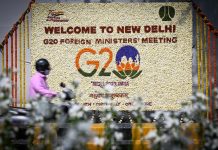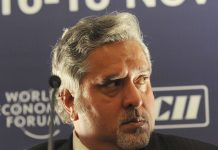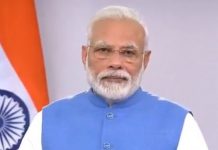Political uncertainty gripped the country after Pakistan Senate, with the Army pulling the strings, passed a resolution on January 5 seeking to defer national elections that are slated to take place on February 8 citing harsh winter weather by Gopal Misra

There is apprehension among Pakistanis that the elections for the much-awaited National Assembly scheduled for February 8, may be further postponed. Professor Ishtiaq Ahmad, a political scientist from Pakistan, presently based in Sweden, says that the Election Commission of Pakistan (ECP) may just issue a notification for its postponement, if the establishment so desires. Pakistan has already been under direct military dictatorships or under civilian proxies since it was carved out by partitioning India on communal lines in 1947. It is also apprehended that the resolution adopted in Senate asking for postponing the polls under the pretext of severe winter might have been sponsored under the instructions of the GHQ; perhaps after finding it difficult to ‘manage’ polls by effecting large-scale rigging as it had done in 2018 to favour its then favourite, Imran Khan and his party, Pakistan Tehreek-i-Insaf (PTI).
The polls should have been held within 90 days of the dissolution of the National Assembly, and Anwar-ul-Haq Kakar, known for his proximity to the present army chief, Asim Munir, was sworn in August, 2022. The polls are already delayed by five months, thus casting shadow even on the constitution of a civilian face of a hybrid regime to take over in Islamabad. It is widely believed that General Munir and his supporters in the army do not want either Khan or PTI to get a majority in the new House. It may be recalled that General Munir had never been considered for the army’s top post during the tenure of the PM Imran Khan. He owes his elevation to erstwhile PM Shehbaz Sharif and his party, Pakistan Muslim League-Noon (PML-N).
Imran Khan too was groomed by the GHQ. He could get the coveted post after 2018 polls, believed to have been rigged during the tenure of the then army chief Qamar Jawed Bajwa and his crony, Faize Hamid, the then director general of the Inter-Services Intelligence (ISI). Later, Bajwa and Hamid fell apart. And since PM Imran Khan was keen to promote Hamid as the new army chief, he too was sent packing that too through a no-confidence motion. Khan has been accusing the GHQ for conniving with certain parties to oust him. The development resulted in the formation a coalition government led by Shehbaaz Sharif, which finally resigned when the National Assembly’s five-year term expired. With the Khan implicated in various cases, he may not be able to contest the forthcoming polls, but the process of rehabilitating Shehbaz Sharif’s elder brother of Nawaz Sharif, a three-time PM, has already begun and he has returned from London to supervise his party, PML-N, in the forthcoming polls at a time when Imran Khan’s popularity is at its peak. Maybe, Khan’s success has made Munir and his generals scared of the outcome of the polls. Therefore, they may prefer postponement of polls.
The Resolution
The Supreme Court of Pakistan has already received a bunch petitions stressing that schedule of the elections, due to be held in February, must be adhered to. The apex court is being requested to ask ECP to ignore the Senate request for the polls postponement. Ironically, a senator of the Pakistan People Party (PPP) who had initially supported the resolution in the House, later chose to oppose the same. Meanwhile, many media channels have described the resolution just a joke; however, it is also being suspected that the ISI cronies have piloted the resolution before the Senate seeking postponement of the polls that too under the pretext of ‘severe winters’ engulfing most of the country. The unexpected Senate resolution passed on January 5 has ignited a heated debate, that too in a thinly attended session with the presence of just 14 lawmakers in the 100-strong House.
Few within Pakistan as well as abroad really believe that the forthcoming polls will be impartial. In the history of Pakistan the only independent and free polls were held in 1970; and that had led to the formation of Bangladesh in1971. The establishment i.e. army believes that if its cronies do not win the elections either its hold on the country would weaken or Pakistan might be further fragmented.
Meanwhile, Khan’s article in “Economist has attracted worldwide attention that the forthcoming polls were likely to be “a disaster and farce”. He like his predecessor, Nawaz Sharif, too has been implicated in a number of corruption cases and also being denied to contest the forthcoming polls. The army’s disenchantment with Khan finally has paved the way for the return of Nawaz Sharif to Islamabad. It is hoped if his petition seeking approval of the Supreme Court seeking permission to contest the elections is allowed, he would finally regain his position of PM.
Army Afraid of Free Polls
The outcome of the 1970 polls was disastrous for the army generals and top bureaucrats, mostly belonging to Punjab. The then army dictator, Yahia Khan’s refusal to swear in Sheikh Mujibur Rehman as the new PM and the crackdown on his supporters in East Pakistan had led to the emergence of Bangladesh. The army did not expect that Rehman’s party, Awami League, would have an unprecedented landslide victory in the elections. Most of the political commentators believe that if the army generals and politicians from Punjab do not address the grievances of the people of Baluchistan and Pashtuns, the 2024 polls, if held impartially, might lead to a situation the country had witnessed after the 1970 elections.
Dilawar Khan, an independent Senator believed to be close to the GHQ, cleverly tabled the resolution seeking postponement of the polls, and got it ratified. It, however, exposed ISI’s limitation in rigging the forthcoming elections. It is being stated that during his recent visit to the US, Munir was told to get the elections conducted as early as possible, paving the way for a new government. He was also asked that his crony, Kakar, should ensure that the polls are held on schedule; otherwise Pakistan would be denied financial as well as defence aid.
Democratic World Cold Shoulders
Both Munir and his crony, Kakar, have been visiting world capitals seeking financial support of their country, but most of the top leaders were reluctant even to meet them. Similarly, Asim Munir, too travelled to the US, China and other western countries seeking financial aid or military hardware, a job seldom an army chief does in any democratic country. Their conduct indicates that both Munir and Kakar are not keen to conduct polls as scheduled.
It may be noted that Pakistan’s president, Arif Alvi, had appointed Kakar on the advice of the outgoing Prime Minister, Shehbaz Sharif and the opposition leader, Raja Riaz Ahmad. Ahmad, who had been associated with a number of political parties such as Bhutto’s Pakistan’s People’s Party, PML-N had joined PTI in 2016. It is widely believed that the two politicians had recommended Kakar as the caretaker PM on the advice of GHQ. The National Assembly was dissolved in August 2023; therefore, the polls should have been conducted before the end of 2023. There are also indications that Asim Munir is keen to ensure that even if the polls were held, the supremacy of the army and its financial interests retained; and the loot of the men in uniform never to be probed. It means only hybrid regimes will be functioning in Pakistan, whether polls are held as scheduled or delayed.













